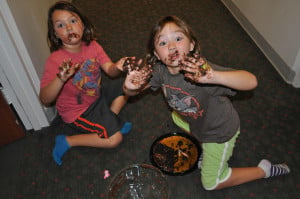Dashing from room to room in Serra, in striped bathing suits and with plastic water pistols dangerously set in their palms, six-year-old twins Aisling and Sabha may be a surprising sight to most students who are accustomed to seeing a general population over the age of 18. But for the Serra freshmen, the formidable pint-sized duo is part of the dorm community.

“For freshmen this is their first year away from home,” said Susan O’Hara, Serra resident fellow (RF) and the twins’ mother. “A lot of them have younger brothers and sisters, so it triggers those automatic nurturing kind of things.”
Growing up on campus as a child is a unique experience, with perhaps some pitfalls. How can six-year-olds fit into the college world, a world of individuals on the cusp of entering the workforce? According to O’Hara, the advantages of raising a family on campus are what bring many RFs to the position.
“Actually, one of the reasons we did it was because of what we’d heard about, from other RFs, about their kids,” O’Hara said.
In fact, the children of RFs may gain an intellectual experience to which few of their school peers have access, perhaps accelerating their precociousness.
“They grow up having this very rich experience of college life,” said Marie-Louise Catsalis, RF at Toyon and mother of two boys, four-year-old Tobin and seven-year-old Kai. “Just from being around college students, I hear their vocabulary expanding, and they use words and concepts that college students are thinking about. Like, ‘Oh, what will I do next with my career?’”
A shifting vocabulary is a change noted by the Serra RFs as well.
“They’ll say, ‘What’s up, dude?’” said Stuart Bennett, O’Hara’s husband. “And they’ll call me ‘Stu.’ They don’t call me Daddy. Everybody calls me ‘Stu,’ so they do, too…it’s kind of funny because they’re six years old and they talk like they’re eighteen.”
To some students, the children take on a younger sibling role. This, however, causes some awkwardness for older RF kids. Andrea and Federico Clerici-Hermandinger, who grew up in Cedro, found that as they grew older these interactions became fewer and fewer.
“I feel like we [hung out with students] when we were younger,” said Andrea, now a sophomore at Palo Alto High School. “Now there’s such a close age difference it’s a little more awkward.”
A high school senior, Federico Clerici-Hermandinger will be leaving Palo Alto and heading to Boston College.
“I didn’t even think about applying to Stanford because I’ve just been on campus for so long,” he said. “But it’s still been a good experience, and it’s showed me a lot of what college is about.”
For the younger children, though, Stanford is still home. Living on a college campus establishes a model of college life for the children, setting Stanford as the norm of what follows high school.
“So a few months ago Kai started saying, ‘I want to go to Stanford’…At the moment, he likes Stanford; this is the place,” Catsalis said. “But as a seven-year-old, that’s all he knows…Most teenagers are thinking, ‘As far away as I can get from my parents.’ But at the moment he’s thinking, ‘I don’t want to leave home!’”
The alcohol use and party scene that pervades university life can pose problems for raising a family, but O’Hara noted that although this was an initial parental concern, in practice it has not greatly affected her children.
“Before we moved in, we thought a lot about what they would see in a freshman dorm, what would be not good for them to see, or how they would process all this,” O’Hara said. “I think actually since we’ve moved in, we haven’t found that to be much of a problem.”
O’Hara and Bennett do not let their children into the dorm on party nights like Friday and Saturday. Aisling and Sabha even managed to sleep through Band Run, which passed right by the Serra RF cottage.
Though on weekdays the door between the cottage and the dorm will often remain open, allowing the girls to run out and mingle with the students and the students to run in as well, on weekend nights the RFs close the door, effectively separating the family world from that of often-rambunctious college students.
Catsalis concurred, though she expressed potential concern for the future.
“I wonder if it’s going to be sustainable when they’re teenagers, just because there will be a lot more temptations,” she said.
Living with a built-in dining hall has its advantages as well, though it does present a somewhat unrealistic image of the real world for the youngsters. O’Hara recalled a trip to the supermarket where one of the children asked what the chef was making that night, prompting curious stares from other shoppers.
The high number of RFs with families on campus has created a built-in community of RF children, a network both for the parents and children.
“There’s a monthly RF meeting, to figure out what we’re doing and it’s hard to have conversations with kids,” Bennett said. “So some of the RAs usually volunteer to entertain the kids or just watch over [them], so that’s always fun.”
Living on campus exposes the children to a range of interesting events. Weekly events in the Toyon performance hall range from Shakespeare and opera to Ballet Folklórico, exposing Tobin and Kai to events beyond the experience of most kids. Ultimately, however, they are still children and while they may live on a college campus, they are not yet ready to fully take part in this world.
When asked if college students are weird or cool, Tobin’s reply was “weird.”
Why?
“Because they have weird t-shirts,” he answered, as a matter of fact.